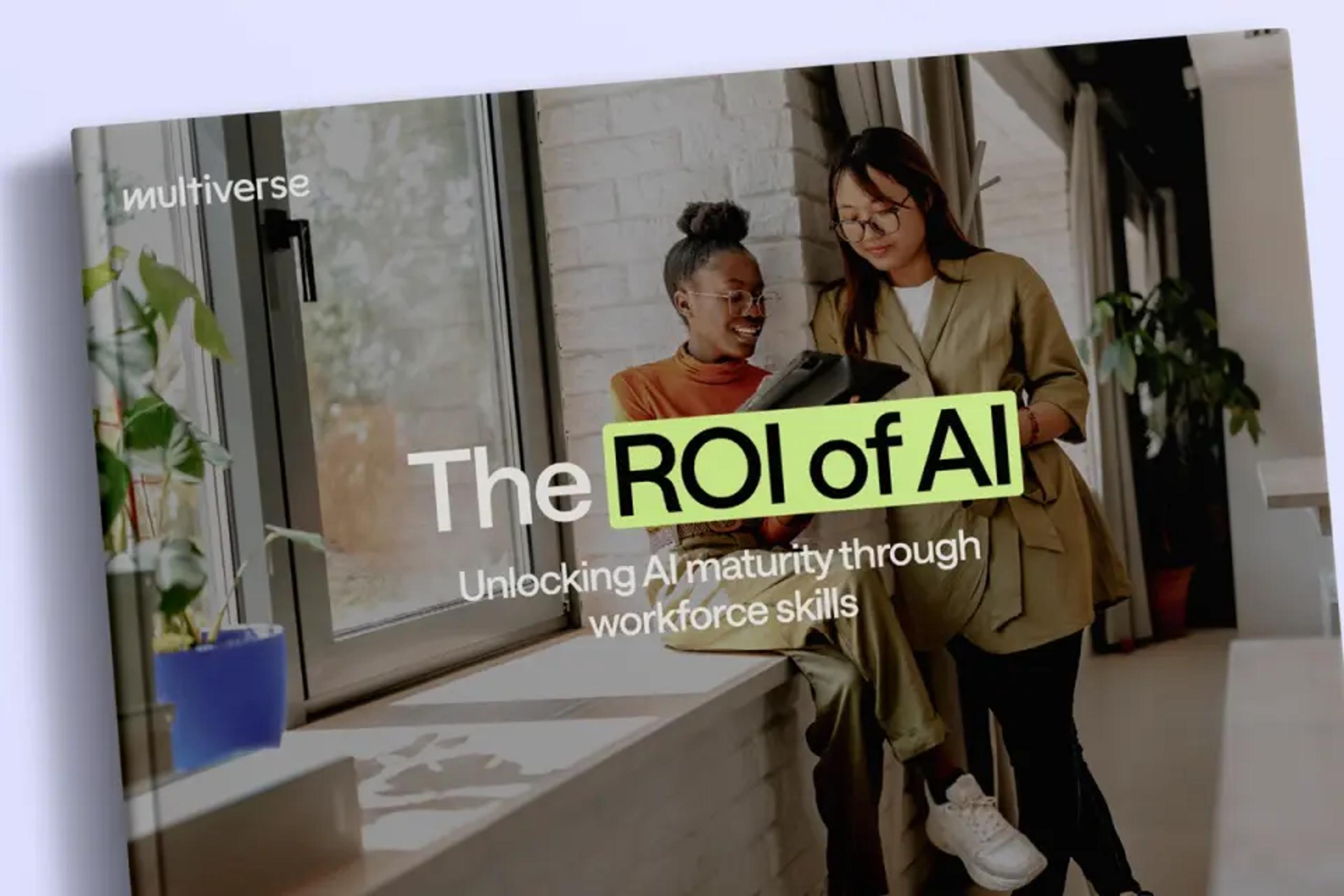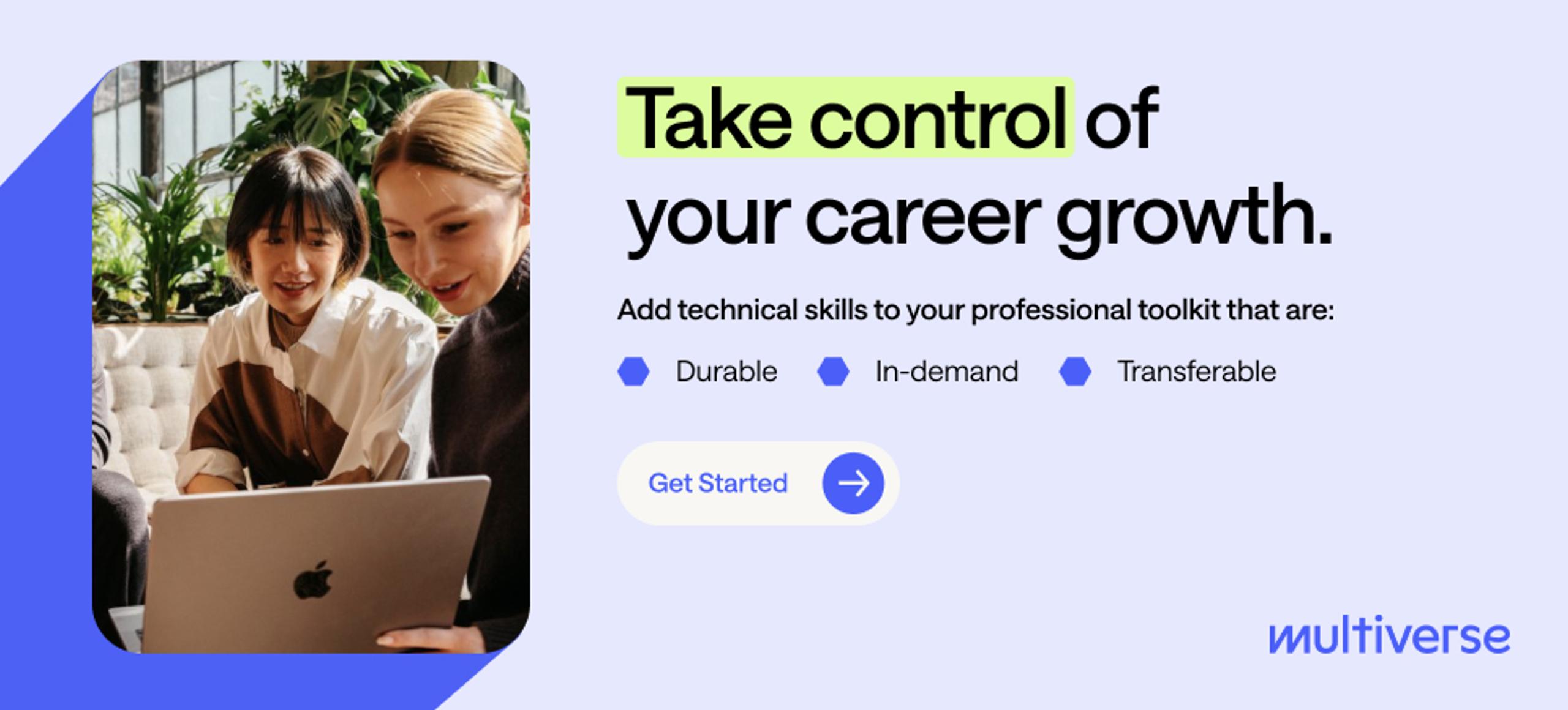If you spend time browsing job boards, you may have noticed that certain roles stay unfilled for months.
Across the UK, industries from construction to tech are grappling with a growing talent gap. In 2023, an astonishing 73% of organisations(opens new window) reported experiencing a skills shortage, and nearly one in three job vacancies go unfilled because employers can’t find the right talent.
These statistics may sound dire, but the skills shortage offers unique opportunities for professionals interested in a career change. As employers search for fresh talent, individuals with in-demand skills can break into new roles and industries. You can take advantage of this shift by upskilling and acquiring new tools for success.
Career transitions require careful planning and strategic skill development. This guide will teach you how to identify necessary skills, expand your professional network, and gain hands-on experience.
Preparing for a career change? Questions to assess your career situation
Are you thinking about changing careers? If so, you’re not alone. LHH’s Global Workforce of the Future(opens new window) reports that 47% of workers are exploring open roles, and 72% evaluate their career plans at least quarterly.
Many professionals seek new careers to improve their salaries, work/life balance, and job satisfaction. But a career transition isn’t right for everyone. These questions will help you evaluate your readiness and decide whether to stay or go.
Perform a self-assessment
Start by evaluating your current situation and your motivation for changing careers. Ask yourself the following questions:
- Which aspects of my current role do I enjoy?
- What would I like to change about my career situation?
- What are my long-term career goals?
- What would my ideal workday look like?
- What type of environment would I prefer to work in?
- Am I mentally and financially prepared to face the uncertainty of the job market?
- What are the potential risks and rewards of changing careers?
These questions will help you clarify your goals and identify potential career paths. For instance, if you want to flex your creative muscles, you might explore careers in marketing and UX design. If you enjoy solving technical challenges, a data analysis or software development role could be right up your alley.
Next, conduct a skills inventory to identify your current strengths and weaknesses. Create a list of transferable skills that can apply to a new career, such as:
- Collaboration
- Conflict resolution
- Problem-solving
- Project management
- Time management
- Writing
Conduct market research
After you complete your self-evaluation, research potential sectors and roles. This process will help identify viable career paths that fit your interests and skill set.
According to a 2024 report by the Edge Foundation(opens new window), these UK sectors are facing the most severe talent shortages:
- Engineering
- Tech
- Creative
- Healthcare
- Construction
- Education
- Sustainability
These high-demand industries offer ample opportunities for career advancement and competitive salaries(opens new window). For example, IT Business Analysts earn a median salary of £51,698, while Software Developers make £49,430 on average.
Once you’ve identified industries of interest, explore available positions on Indeed, LinkedIn, Reed, and other job boards. Identify high-demand areas by spotting popular roles and observing which positions frequently go unfilled.
Identifying and acquiring new skills
Set yourself up for success by gaining relevant knowledge and competencies. These abilities will help you develop a competitive resume and change careers smoothly.
Skills gap analysis
Review job descriptions for your target fields and create a list of skills that appear frequently across job postings in your target field. Compare these requirements to your existing skills to identify gaps in your knowledge.
Say, for instance, you want to pursue a career as a Data Analyst. You may excel at statistical analysis and have a strong grasp of Python and R. However, many positions require knowledge of data visualisation tools like Tableau, which may be unfamiliar to you. Learning this technology will help you bridge this skill gap and improve your qualifications for your desired role.
Learning and development
You don’t need to return to college to prepare for a career change. Here are a few ways to upskill effectively:
- Online courses: Many platforms offer free or affordable online courses. These classes let you study topics of interest at your own pace. Popular virtual learning platforms include Coursera, FutureLearn, and The Open University.
- Certifications: Professional organisations frequently offer certifications that can enhance and verify your expertise in specific areas. These industry-recognized credentials boost your credibility and allow you to gain new abilities.
- Professional apprenticeships: Professional apprenticeships combine traditional classroom learning with paid on-the-job training. These comprehensive learning experiences enable learners to quickly build competency in new areas. Multiverse offers several such programmes, including the Advanced Data Fellowship for data analysts, AI for Business Value, and Data & Insights For Business Decisions.
Leveraging new tools and technologies
Employers typically look for candidates who understand how to use emerging technologies and relevant tools. Get ready for a career change by becoming proficient in your new field’s tools of the trade.
Adopt industry-specific tools
Every professional uses specialised software and technologies to complete tasks. Browse job descriptions to identify necessary tools. You can also talk to professionals in the field to learn about the most commonly used applications and platforms.
Here are a few examples of industry-specific technologies:
- Customer relationship management (CRM) software: Sales Representatives use CRM applications to store client data, track leads, and strengthen customer relationships. Popular programmes include HubSpot and Salesforce.
- Data visualisation tools: Applications such as Microsoft Power BI and Tableau transform raw data into accessible graphics. Data Analysts, Business Intelligence Analysts, and Product Managers often use data visualisation tools.
- Project management software: Project Managers, Marketing Coordinators, and other professionals use these tools to organise complex projects. Asana, Jira, and Trello are commonly used project management applications.
Many platforms offer introductory tutorials, how-to guides, and free trials. Use these resources to familiarise yourself with their features and gain hands-on experience.
Study novel technologies
Gain a competitive edge by learning emerging technologies like artificial intelligence and automation.
AI and machine learning are the most desired skills(opens new window) for UK employers in all sectors. Businesses use these technologies to make strategic decisions and improve efficiency. For example, a fashion company can use AI to analyse thousands of social media posts about clothing and predict market trends.
Many companies also use automation software to handle repetitive tasks. A marketing company could automate email campaigns, while a retailer could use automation software for inventory management. These tools boost productivity and reduce the risk of human error.
There are many resources to help you master innovative technologies. For example, Multiverse offers an Artificial Intelligence (AI) Jumpstart module. This course teaches predictive modelling, machine learning, and other in-demand AI skills. You can also learn foundational concepts by completing online courses and watching relevant video tutorials.
Building a strategic network
Some career changers have connections in their new fields, but many professionals must build networks from scratch. These tips will help you make new contacts and nurture meaningful relationships.
Strengthen your networking skills
Networking is a vital part of career exploration and growth. A strong network can help you find jobs and provide support throughout your career change and beyond. Use these strategies to network effectively:
- Join existing communities: Look for formal and informal networks in your new field. For example, the Multiverse Community includes thousands of apprentices and alumni. Members exchange advice, mentor new professionals, and gather to discuss their experiences.
- Help others: Networking isn’t just about getting a job; it’s also about developing authentic, long-lasting friendships with peers. Develop mutually beneficial connections by cheering on others, offering assistance, and swapping resources.
- Go beyond small talk: Get to know your new contacts on a deeper level by asking thoughtful questions about their career goals and journeys. These meaningful conversations will strengthen your relationships and allow you to gain valuable insights.
- Stay in touch: Check in with your contacts periodically to maintain your connection. For example, you can share a relevant article or job opportunity.
Join professional organisations
Get involved with organisations in your sector to meet colleagues and potential mentors. Examples of UK associations include the British Computer Society and the Institution of Analysts and Programmers.
These associations often organise networking opportunities like conferences and industry meetups. Attend these events to make valuable connections and learn about industry trends.
Build a presence on LinkedIn
Join LinkedIn to connect with professionals in your desired field. Follow industry leaders to discover emerging trends and challenges. You can also create thoughtful posts to share your expertise and engage with other people’s content.
Seek mentors
Many experienced professionals are eager to offer advice and support for career changers. Some organisations have formal programmes to connect mentors and mentees. Alternatively, consider inviting people you admire for coffee to start building connections.
Conduct informational interviews
Deepen your knowledge of your new field with informational interviews. Ask people in your desired position for a short meeting so you can learn more about the role. Come prepared with a list of questions, such as:
- What are your daily responsibilities?
- What challenges have you encountered in this role?
- What are the most valuable skills for this career?
- What types of people excel at this company?
Planning for the transition
Transitioning into a new career can be exciting yet stressful. Careful planning will help you make the switch as smoothly as possible.
Create a transition plan
Develop a transition plan to stay organised throughout your career switch. This roadmap should include clear and specific goals. For example, you may aim to secure a position as a Project Manager or strengthen your data analysis skills.
Next, outline actionable steps, such as:
- Perform a skills inventory
- Follow thought leaders for inspiration and insights
- Complete online certifications to gain new qualifications
- Update your resume
- Consult a career coach for interview advice
- Apply to two jobs per day
Of course, even the most thoughtful plans don’t always go as expected. Stay flexible, and don’t hesitate to seize unexpected opportunities.
Establish your timeline
Transitioning to a new career can take months, especially if you must upskill or reskill. Stay motivated by setting reasonable timelines and milestones. For instance, you might aim to learn a new programming language in three months and build an online portfolio during a holiday weekend.
Manage your finances
A solid financial plan will give you peace of mind during your career transition. Consider sticking with your current work while you apply for new jobs to maintain a steady source of income and benefits. Alternatively, you can explore options to upskill your capabilities in your current role.
Some people save money in an emergency fund to cover their expenses for several months. This approach lets you dedicate yourself fully to upskilling and the job hunt.
Develop resilience
It’s normal to face obstacles while changing careers. Stay open-minded and positive as you explore your prospects, and protect your self esteem by celebrating small victories along the way.
Gaining practical experience
Hands-on experience will demonstrate your commitment to potential employers and strengthen your resume. Here are four ways to develop experience without leaving your current role.
Internships and part-time roles
Search job boards for paid internships and part-time jobs in your new field. These opportunities enable you to receive training and expand your network.
Volunteer
Volunteering allows you to build your expertise while contributing to a good cause. Contact local nonprofits to inquire about volunteer opportunities related to your preferred field. For instance, an aspiring Web Developer could volunteer to revamp an organisation’s website and social media presence.
Freelance and gig work
Once you’ve gained foundational skills, you can offer your services as a freelancer or gig worker. Create profiles on Freelancer, Fiverr, and other freelancing platforms to apply for short-term projects. These jobs can help you build your reputation and develop an impressive portfolio that showcases your abilities.
Complete a professional apprenticeship
Another excellent option for gaining practical experience is participating in an on-the-job training programme, like the professional apprenticeships offered by Multiverse. These programmes allow you to continue working while developing critical skills in data, tech, or business. You’ll learn through hands-on experience, guided by expert coaches, and apply new knowledge directly to your role. With employer funding and a nationally recognised qualification, these programmes help you future-proof your career and increase your promotion and salary potential.
Take control of your career trajectory
As the UK talent shortage continues, the demand for skilled professionals will keep rising. But you can future-proof your career by upskilling in high-demand areas like AI and data analysis. These exciting career paths offer many opportunities for career advancement and long-term job security.
Prepare for career growth today with Multiverse’s professional apprenticeships. The best part? You’ll expand your knowledge while gaining practical experience in your chosen field — and you can keep your current job as you level up your abilities. Complete our short application(opens new window) to get started.







